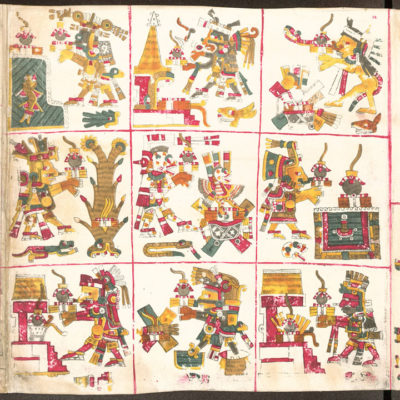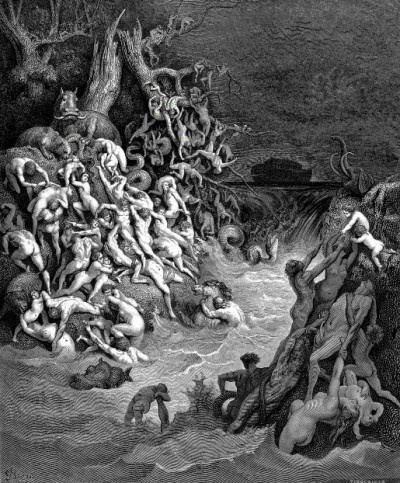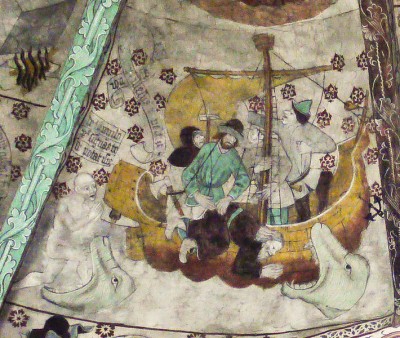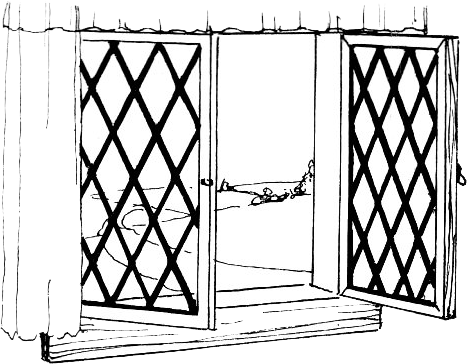I was having trouble understanding the Bible story of Hagar talking with an “angel of the LORD.” It starts out clearly enough, with Sarah telling her husband Abraham to go sire a child by her Egyptian handmaid, Hagar. So Abraham impregnates Hagar, at which point Hagar becomes hateful toward Sarah. Sarah is furious; Abraham tells her to deal with Hagar however she wishes. When Sarah is then harsh with Hagar, the servant flees to the wilderness.
Genesis 16:1 Now Sarai Abram’s wife bare him no children: and she had an handmaid, an Egyptian, whose name was Hagar.
2 And Sarai said unto Abram, Behold now, the LORD hath restrained me from bearing: I pray thee, go in unto my maid; it may be that I may obtain children by her. And Abram hearkened to the voice of Sarai.
3 And Sarai Abram’s wife took Hagar her maid the Egyptian, after Abram had dwelt ten years in the land of Canaan, and gave her to her husband Abram to be his wife.
4 And he went in unto Hagar, and she conceived: and when she saw that she had conceived, her mistress was despised in her eyes.
5 And Sarai said unto Abram, My wrong be upon thee: I have given my maid into thy bosom; and when she saw that she had conceived, I was despised in her eyes: the LORD judge between me and thee.
6 But Abram said unto Sarai, Behold, thy maid is in thy hand; do to her as it pleaseth thee. And when Sarai dealt hardly with her, she fled from her face.
Then Hagar has an interaction with the angel of the LORD, who tells her to return to Sarah, and offers some odd predictions about her unborn child:

Genesis 16:7 And the angel of the LORD found her by a fountain of water in the wilderness, by the fountain in the way to Shur.
8 And he said, Hagar, Sarai’s maid, whence camest thou? and whither wilt thou go? And she said, I flee from the face of my mistress Sarai.
9 And the angel of the LORD said unto her, Return to thy mistress, and submit thyself under her hands.
10 And the angel of the LORD said unto her, I will multiply thy seed exceedingly, that it shall not be numbered for multitude.
11 And the angel of the LORD said unto her, Behold, thou art with child, and shalt bear a son, and shalt call his name Ishmael [God has hearkened]; because the LORD hath heard thy affliction.
12 And he will be a wild man; his hand will be against every man, and every man’s hand against him; and he shall dwell in the presence of all his brethren.
So far, so good-ish. But the next verse, Genesis 16:13, is so confusing, especially since the story up to now has been about the angel of the LORD, not the big man himself:
Genesis 16:13 And she called the name of the LORD that spake unto her, Thou God seest me: for she said, Have I also here looked after him that seeth me? —King James Bible
What does that mean? So I consulted a parallel bible, for some insight, finding 14 more translations. Did it help to clarify the verse? See what you think.
Genesis 16:13 She gave this name to the LORD who spoke to her: “You are the God who sees me,” for she said, “I have now seen the One who sees me.” —New International Version (©1984)
Genesis 16:13 Thereafter, Hagar used another name to refer to the LORD, who had spoken to her. She said, “You are the God who sees me.” She also said, “Have I truly seen the One who sees me?” —New Living Translation (©2007)
Genesis 16:13 So she called the name of the LORD who spoke to her, “You are a God of seeing,” for she said, “Truly here I have seen him who looks after me.” —English Standard Version (©2001)
Genesis 16:13 Then she called the name of the LORD who spoke to her, “You are a God who sees”; for she said, “Have I even remained alive here after seeing Him?” —New American Standard Bible (©1995)
Genesis 16:13 Hagar named the LORD, who had been speaking to her, “You Are the God Who Watches Over Me.” She said, “This is the place where I watched [the one] who watches over me.” —GOD’S WORD® Translation (©1995)
Genesis 16:13 And she called the name of the LORD that spoke to her, You God see me: for she said, Have I also here looked after him that sees me? —American King James Version
Genesis 16:13 And she called the name of Jehovah that spake unto her, Thou art a God that seeth: for she said, Have I even here looked after him that seeth me? —American Standard Version
Genesis 16:13 And to the Lord who was talking with her she gave this name, You are a God who is seen; for she said, Have I not even here in the waste land had a vision of God and am still living? —Bible in Basic English
Genesis 16:13 And she called the name of the Lord that spoke unto her: Thou the God who hast seen me. For she said: Verily here have I seen the hinder parts of him that seeth me. —Douay-Rheims Bible
Genesis 16:13 And she called the name of Jehovah who spoke to her, Thou art the God who reveals himself, for she said, Also here have I seen after he has revealed himself. —Darby Bible Translation
Genesis 16:13 And she called the name of the LORD that spake unto her, Thou art a God that seeth: for she said, Have I even here looked after him that seeth me? —English Revised Version
Genesis 16:13 And she called the name of the LORD that spoke to her, Thou God seest me: for she said, Have I also here looked after him that seeth me? —Webster’s Bible Translation
Genesis 16:13 She called the name of Yahweh who spoke to her, “You are a God who sees,” for she said, “Have I even stayed alive after seeing him?” —World English Bible
Genesis 16:13 And she calleth the name of Jehovah who is speaking unto her, ‘Thou art, O God, my beholder;’ for she said, ‘Even here have I looked behind my beholder?’ —Young’s Literal Translation

So what did Hagar say? I vote for the Douay-Rheims Bible version —”Verily here have I seen the hinder parts of him that seeth me,” or its friend, “Even here have I looked behind my beholder?” from Young’s Literal Translation — mainly because it gives me a chance to use this great painting by Michelangelo showing Yahweh’s hinder parts.
You have to assume that any translator of the Bible had tons of scholarly materials at hand and would stand up and defend his or her version ad nauseum. Reasonable people disagree. So, what the hell, just pick the one you like best!
By the way, I know of one other instance in the Bible where Yahweh’s rear is mentioned, when Moses hides in a cleft of rock.
To see multiple translations of any Bible verse, go to this excellent parallel translation site.






